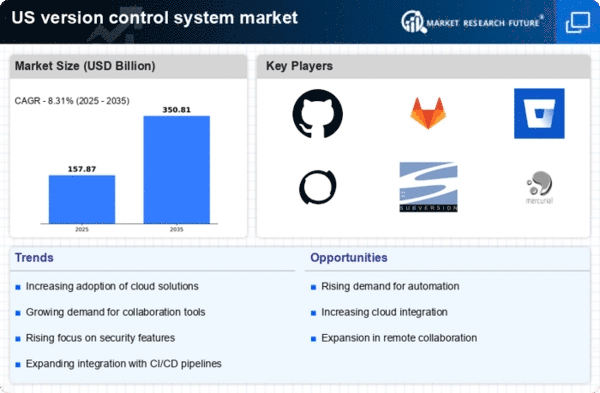Expansion of Remote Work Culture
The expansion of remote work culture is significantly impacting the version control-system market. As organizations adapt to remote work environments, the need for effective version control solutions has become more pronounced. Version control systems enable teams to manage code changes efficiently, regardless of their physical location. This shift has led to a growing reliance on cloud-based version control solutions, which facilitate access and collaboration from anywhere. Recent studies suggest that remote work has increased the demand for version control systems by approximately 25%. This trend indicates that the version control-system market is likely to continue evolving, with a focus on providing solutions that cater to the unique challenges posed by remote work arrangements.
Growing Demand for Collaboration Tools
The version control-system market is experiencing a notable surge in demand for collaboration tools. As teams become increasingly distributed, the need for seamless collaboration has intensified. This trend is particularly evident in software development, where version control systems facilitate real-time collaboration among developers. According to recent data, the market for collaboration tools is projected to grow at a CAGR of 15% through 2026. This growth is likely to drive the adoption of version control systems, as organizations seek to enhance productivity and streamline workflows. The integration of features such as branching, merging, and conflict resolution within version control systems is becoming essential for teams aiming to improve their collaborative efforts. Consequently, the version control-system market is poised to benefit significantly from this growing demand for effective collaboration tools.
Rising Importance of Open Source Solutions
The version control-system market is increasingly influenced by the rising importance of open source solutions. Open source version control systems, such as Git, have gained substantial traction due to their flexibility and cost-effectiveness. Organizations are drawn to these solutions as they allow for customization and community-driven support. Recent surveys indicate that approximately 70% of developers prefer using open source tools for version control, highlighting a significant shift in user preferences. This trend is likely to drive innovation within the version control-system market, as vendors strive to enhance their offerings to compete with open source alternatives. Furthermore, the collaborative nature of open source projects aligns well with the evolving needs of development teams, suggesting that the version control-system market will continue to adapt to this growing demand for open source solutions.
Increased Focus on Compliance and Governance
In the version control-system market, there is an increasing emphasis on compliance and governance. Organizations are under pressure to adhere to various regulatory standards, which necessitates robust version control mechanisms. This is particularly relevant in industries such as finance and healthcare, where data integrity and traceability are paramount. The implementation of version control systems enables organizations to maintain comprehensive audit trails, ensuring compliance with regulations such as HIPAA and SOX. As a result, the market is witnessing a shift towards solutions that offer enhanced compliance features. Recent statistics indicate that companies investing in compliance-related technologies have seen a 20% reduction in regulatory fines. This trend suggests that the version control-system market will continue to evolve, with a focus on providing solutions that meet stringent compliance requirements.
Technological Advancements in Software Development
Technological advancements in software development are playing a crucial role in shaping the version control-system market. The rise of agile methodologies and continuous integration/continuous deployment (CI/CD) practices has necessitated the adoption of sophisticated version control systems. These systems are now expected to support rapid development cycles and facilitate automated testing and deployment processes. Recent data indicates that organizations implementing CI/CD practices have experienced a 30% increase in deployment frequency. This trend underscores the importance of version control systems in modern software development environments. As organizations strive to enhance their development processes, the version control-system market is likely to witness increased investment in advanced features that cater to the needs of agile teams.
















